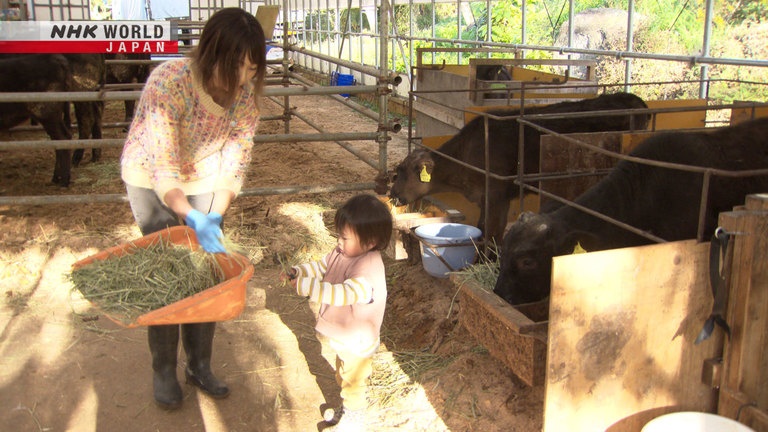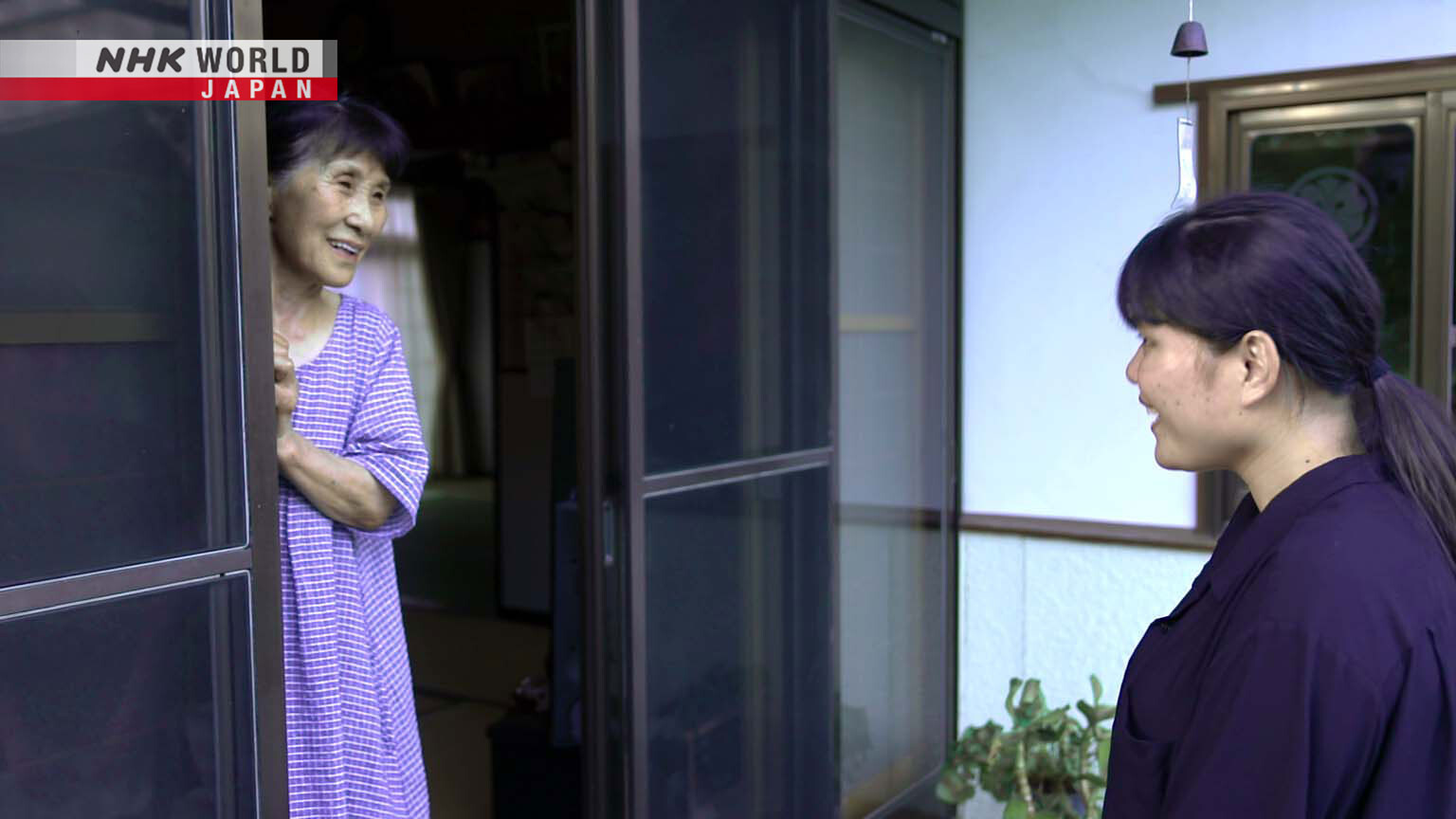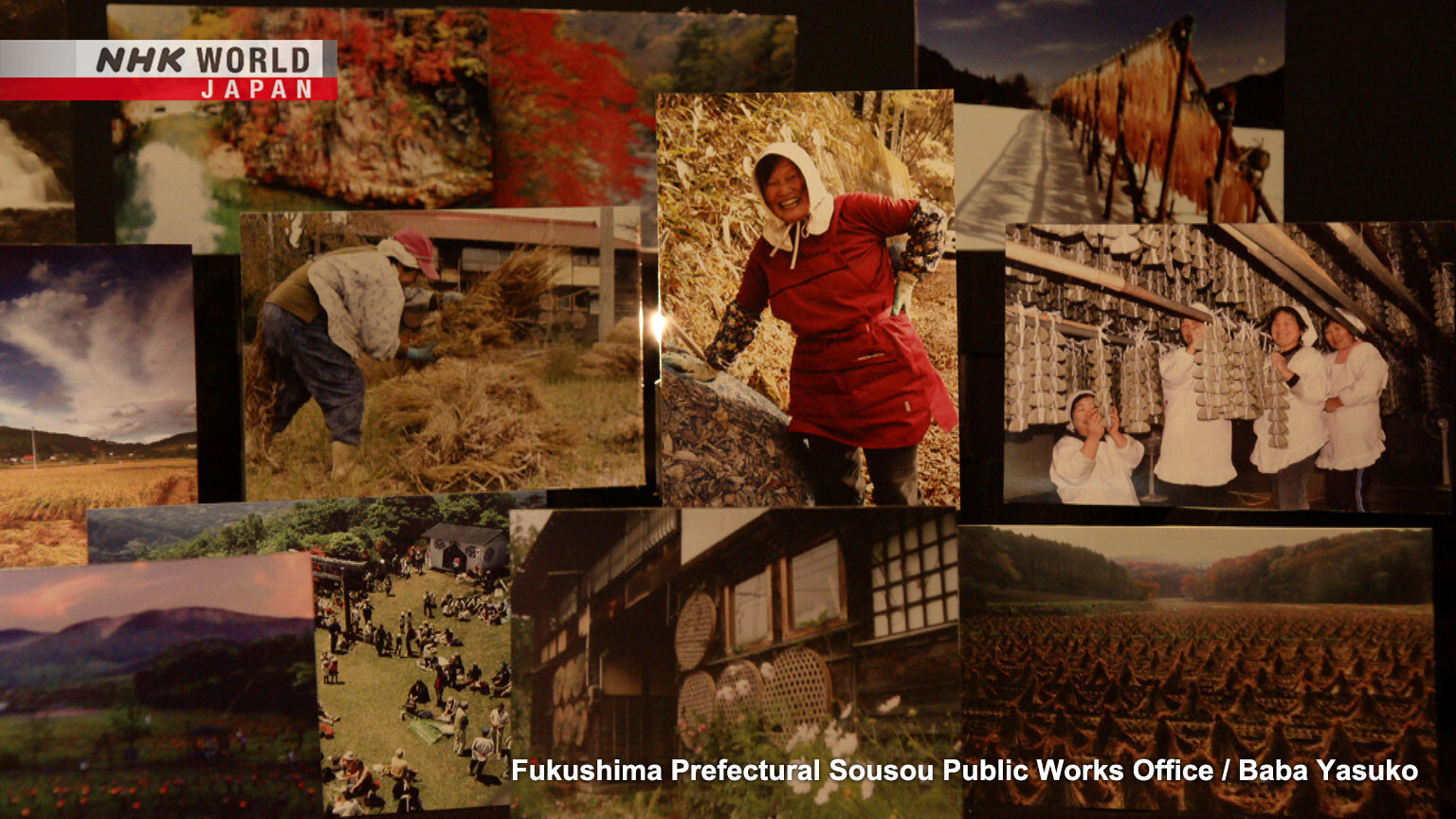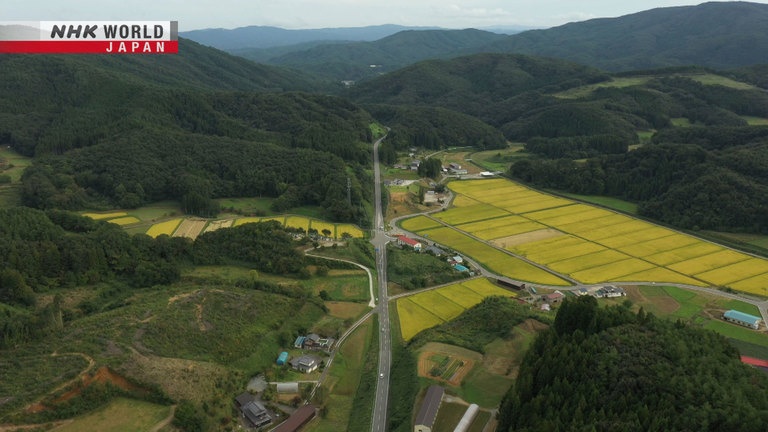In Fukushima, an "Abukuma Romantic Road" photo contest was held in 2010, the year before the nuclear accident. We seek out the people behind the photos and discover how life has changed for them.




Transcript
The Abukuma Romantic Road is part of National Route 399,
which runs through the beautiful scenery of the Abukuma region in eastern Fukushima.
In 2011, because of a dangerous situation at the nuclear plant on the coast, local residents had to evacuate.
One year earlier, in 2010, the road had been the theme of a photo contest.
That contest was held once, but never again.
The submissions represent a record of the region shortly before the accident.
They offer glimpses of simpler days deep in the countryside, the wellspring of Japanese culture.
Taking these photos as a starting point, we set out to learn more about the Abukuma Romantic Road.
We're looking for the location shown in this photograph.
"It was taken 13 years ago."
- "Before the accident."
- Oh, before the accident?
What has changed since that time?
To find out, we spent a year exploring scenes, and stories.
Our journey begins in April, 2023.
Throughout the Abukuma Highlands, spring flowers are blooming.
Hello. We're from NHK.
We stop to ask about a colorful scene at the side of the highway.
"The tulips look like they're in full bloom."
Well, it's warm today, so they opened up.
In 2016, Niita Masaharu returned from an evacuation site, and started growing flowers again.
Wow, thank you so much.
These are for us?
- Thank you.
- Drink it while it's cold.
In March 2011, the Great East Japan Earthquake and Tsunami led to an accident at the Fukushima Daiichi nuclear power plant.
A large amount of radioactive material fell on these areas.
The national and local governments issued an evacuation order for locations along the Abukuma Romantic Road.
Residents had no choice but to leave home, breaking links with their everyday routines.
But now, 13 years later, most restrictions have been lifted, and the rhythms of everyday life are returning.
Look, a swallow.
During the evacuation, they stopped coming here.
That's because the rice fields weren't being used.
Swallows use mud from the fields to build their nests.
The animals here understood.
Along the Romantic Road are some great places to see cherry blossoms.
That photo was taken about 25 kilometers from the site of the nuclear accident.
- "What's happening today?"
- Blossom-viewing.
Please step inside.
"Hello. Sorry to interrupt."
Edit it to make everyone look nice!
They have a big turnout for the blossom-viewing party this year.
It's been a long time.
Three years. We all got older.
We're making up for lost time.
"My hair's gray now!"
This place wasn't always known for the beauty of its cherry blossoms.
50 years ago, this was a village with nothing to speak of, really.
People decided to change that, and planted cherry trees.
The contest entry shows a cherry tree that has particular significance for the local community.
This is a special one.
It's been here some 220 years.
Roughly.
They call it the "seed-sowing cherry."
When its flowers bloom, people start planting their crops.
"What do you do at this time of year?"
We keep the vegetation in check.
From around May each year, the focus is on farming.
Four weeks after the seed-sowing cherry tree blossomed, we're back.
Good morning.
We're here to see rice seedlings being planted in the paddies.
This year's seedlings are fantastic.
Good, firm roots.
I'm really happy that they're doing so well.
After the nuclear accident, many of Kowanashi's rice farmers abandoned that way of life.
But rice-planting time still brings the community together.
When help is needed, it's available. No money's involved. We call it "yui."
Supporting each other. That's the spirit of yui.
For two years after the accident, growing crops was prohibited.
Even after soil decontamination, it took another two years for rice grown here to be declared safe to eat.
What dominated our thoughts was the amount of cesium in the soil.
When the rice was tested and found to be safe, it was a huge relief.
For rice or vegetables, good soil is essential, and it's great now.
Local residents worked hard to restore the beauty of the local scenery along the highway.
- "How's it looking?"
- Perfect!
A secluded forest, not far from the road.
In June, some precious creatures gather here.
These days, the forest green tree frog is quite rare in these parts.
It lays eggs in the branches of trees.
And this is one of the very few places around here where that behavior can be observed.
Here's a prize-winning entry in the photo contest.
These children are totally absorbed in trying to catch something in the river.
The photo was taken in Iitate, along the northern section of the Romantic Road.
Before the accident, around 6,500 people lived here.
Since the evacuation order was lifted in 2017, around 20 percent of the residents have returned and are rebuilding their lives.
One of them helped us find the spot where the photo was taken.
Here's the river. You see that tree?
That's the one in the photo. You can see the mountain too.
So this is where the children were playing.
"Do you still see children playing here like that?"
No.
There has been no decontamination work yet, and it's all overgrown.
I believe the riverbed is still contaminated.
We tracked down the photographer: Kanno Chiyoko.
She came from a nearby town to take photos, and happened upon the children.
They're totally focused on whatever they're trying to catch.
You can see their excitement! They know something's there.
What about the children in the photo?
What does that day mean to them now?
In another of Kanno's pictures, we see a happy smile.
Who is this, we wonder?
At the time, she was at elementary school.
Now, she's 23 years old.
This takes me back.
I used to play in the river, catching frogs and tadpoles.
Her parents divorced when she was still young.
She grew up in her father's family home in Iitate.
The river, the hills, the homes. The whole community was her playground.
There was no one home after school, so I'd drop my school bag and head out.
I'd find somewhere to play, or just go straight to the river.
I'd arrive home soaked, and get scolded.
The river was soothing, in almost a spiritual way.
I was seeking a sense of belonging in a place other than home.
After the accident, she evacuated to Fukushima City.
But in the city, she could find nowhere that gave her the same sense of belonging.
The city I ended up in had nowhere like the river. It was disorienting.
Linked to that, I found it tough to make new friends.
I spent a lot of time at home, not as a recluse, just cooped up.
These days, Megumi works at a toy store.
She's still living in Fukushima City.
Caught up in the routines of work and city life, she has never gone back for a stroll in the community that nurtured her.
I'd love to do that.
I wonder what's changed, and how the recovery is going.
In August, we went to Iitate together.
- "Where was your house?"
- Here.
The house was demolished some years ago.
Only a vacant lot remains.
Was it here?
I don't remember this at all.
I think it was a bit wider than it is now.
The scenery is so different. It's unrecognizable.
But some things have not changed or disappeared.
I remember that frog.
I'm surprised it's still here.
Long time no see! Wow, you remember me!
An unexpected reunion.
Members of the local community had always looked out for her.
I wondered how you were doing. I'm glad you're well.
I met a mutual friend of ours, too.
Ah, this takes me back. You were such a cute kid.
Ah, I won't sleep tonight! Seeing you again has made me too excited.
The moment I arrived, a wave of nostalgia hit me.
I didn't live here all that long.
But the time I spent here means so much to me.
I want to hold this village in my heart, keep it in memory. Never let it go.
Our next stop along the Romantic Road is Miyakoji.
We are visiting a special event.
The Miyakoji Lantern Festival.
It wasn't held during the evacuation, but now it's back.
The event features 10,000 bamboo lanterns.
We got together with someone who has special feelings about the festival.
"Where did you travel from today?"
I've come all the way from Nagano.
But originally, I'm from here.
Before the nuclear accident, Yoshida Toshihachi lived here with his wife and three children.
He was a farmer whose passion was bringing new life to the community.
He and his friends thought up the festival.
And to encourage more people to visit, they were the ones who came up with the name: "Abukuma Romantic Road."
Back then we already had a declining population, and a high average age.
I could see that this community would soon become a pretty desolate place.
I wanted life here to feel brighter, more lively. That's what motivated me.
The accident changed everything.
Putting the safety of his children first, he decided to leave.
He's attending the festival for the first time in six years.
And meeting friends who returned to the community.
It's not easy for him.
I was vocal about local revitalization, and convinced others to join in.
I played a pretty prominent role.
Then disaster strikes, and off I go. Was that actually the right thing to do?
I can't avoid the thought that I simply ran away.
I feel that more strongly than anyone.
This year, he received an invitation.
His old friends reached out to him.
It's been such a long time.
- How many years?
- Five or six.
This man laid the foundations, and we just kept things going.
You're too kind.
We know it's been difficult for you to make it to the event.
But we're so pleased to see you again!
- Thank you very much.
- I'm glad you're doing well.
Earlier, you were speaking about the weight of regret.
But it seems my old friends don't think that way at all.
So maybe it's all in my head.
Being here today really means a lot.
Along the Abukuma Romantic Road, the rice has ripened.
In Kowanashi, too, the eagerly awaited harvest-time has arrived.
- "How's it looking?"
- Not bad.
This year, they gather nearly 5 tons of rice.
- "How's the rice this year?"
- Great!
It's nice and firm.
Friends get together to cook up a batch of freshly harvested rice.
Under the boughs of the "seed-sowing" cherry tree, a gathering is held to share gratitude for the harvest.
It's a pleasure to spend time with such beautiful people!
It doesn't get better than this.
There were no get-togethers after the accident, but they're essential.
Even nextdoor neighbors couldn't meet.
It would be wonderful to get back to how we were before that time.
This Fall photograph, too, was taken in 2010, the year before the nuclear accident.
We meet the photographer.
- "Here's the photo..."
- It brings it all back.
Other prizewinners in the contest said they liked this photo.
They asked where it was, because they wanted to visit.
Ishii Hiromi met her husband in Tokyo.
After getting married, they came to live in Tsushima, which was his hometown.
This was one of the most heavily contaminated areas along the highway.
For a long time, people were not allowed to come back.
In 2023, the evacuation order was partially lifted.
But most people are still living elsewhere.
My memories of this place are more fun than painful.
I enjoyed the shopping, and made friends with the people who lived here.
We had great conversations.
I remember it very fondly.
For a long time, high radiation levels blocked recovery efforts.
In some areas, it was seven years before decontamination work began.
The government covers the cost when buildings need to be demolished.
This house was built over 150 years ago.
Hiromi was a stranger to the local lifestyle when she came to live here at the age of 21.
The first thing I learned was how to light this old oven.
I'd stay put until it was going. I couldn't just walk away.
I'd gaze at the fire.
And wonder how many people from past generations had done the same.
I knew I had to look after this house.
That's what I thought as I gazed at the flames.
The photo she submitted to the contest features the home of a good friend.
Right here.
It's called "Torimon." It's a gate with a space for passing through.
This wooden structure also functioned as a residence.
It was built 190 years ago.
I always thought that the name "Torimon" had a nice ring to it.
I was thinking about which photo to submit to the contest.
And a title popped into my head: "Torimon's Swaying Cosmos."
The friend who lived here left after the nuclear accident, and has no plans to return.
The gate is scheduled for demolition.
Hiromi has to decide about the fate of her own home, too.
It feels like they're destroying something that money can't replace.
When I got married, I thought
I'd spend the rest of my life here.
I thought things would stay the same forever.
But that dream came to an abrupt end.
We traveled the length of the Abukuma Romantic Road, seeking out the places where the photographs were taken.
We're looking for the location shown in this photo.
I don't know any fields this big.
Oh, wait! Got it!
See the red roof?
And another, just behind it.
This was taken before the disaster. It was taken here, right?
The photo shows a cowshed.
But there have been no cows here since the evacuation.
The owner's parents kept cattle.
But they shut down the business because of old age.
After the evacuation, my parents were alive, but getting weaker.
It's a shame they weren't able to carry on doing the work they loved.
Up until the nuclear accident, the high-quality Japanese Black breed of beef cattle was raised in the Abukuma Highlands.
Afterwards, around 700 livestock farmers stopped doing business -
and that's just in the municipalities along the highway.
But we met one young man who is devoting his life to livestock farming.
Seven years ago, Niita Takuma and his wife moved back here.
In the city where they were evacuated, he had a job as a truck driver.
After the evacuation order was lifted, he faced a tough decision.
Should he return to his hometown?
Should he take over the livestock business that his father had been forced to give up?
We went back and forth.
We'd talk about doing it, but then we'd talk about staying in the city.
We had that conversation all the time.
After much discussion, they decided they would take over the family business.
Until that point, I hadn't considered for whose sake I was living my life.
My grandfather started the business.
My father took over from him and brought me up to be who I am.
It seemed like something I had to do.
Radiation contamination made the job challenging in new ways.
The feed had to be confirmed as safe.
And there were pre-shipping radiation checks.
But he and his wife say they have no regrets.
They want their children to call this community their home.
Sometimes I'll be feeding the cows, and I'll notice the kids are there.
It will strike me how much they've grown.
It's a fulfilling life.
This is where I was raised.
So I quickly felt at home.
From my perspective, it was a good decision.
The village of Kawauchi was one of the least contaminated places along the highway.
People began returning here in 2012, the year after the disaster.
New residents were encouraged to move here, and the local population recovered to 60 percent of its pre-accident size.
On New Year's Eve, current residents and those who left gather at this temple.
It has long been a focus of community life.
Happy New Year! How was last year?
All your children and grandchildren!
It's exhausting! Getting them all fed!
I just love Kawauchi.
I want to move back when I retire and take things easy here.
It's a great place, even though it doesn't have much of anything.
Conditions aren't perfect tonight, but the stars are very pretty.
You get Fall colors, Summer greenery. Seasonal beauty.
I want people to feel comfortable reaching out to me.
This temple is a spiritual home, if you like.
A place where you can enjoy peace of mind.
Winter in the Abukuma Highlands can be bitterly cold.
People used to get snowed in.
It was difficult to move around in winter.
Those severe conditions were actually perfect for producing a preserved food called shimi-mochi.
Thanks for having us.
We met one of the people who were there that day: Shinkai Mitsuko.
She vividly remembers the occasion.
It was very cold, but we were told to smile.
It really was extremely cold.
Shimi-mochi freezes solid.
It melts a little during the day, then freezes again at night.
After 2-3 months, the mochi dries out, and can be stored for a long time.
Shimi-mochi is made from pounded rice and wild plants.
It is freeze-dried over the course of several months.
Let me try some.
Food to get you through a tough winter.
An invention of resourceful ancestors.
Mmm, tastes good!
Even my great-grandchildren eat it.
They say, "Can we have more black rice cake?"
This news report from before the nuclear accident shows shimi-mochi being made.
It was an everyday food that found popularity as a local specialty.
Villagers began making shimi-mochi in commercial batches in 1990.
At first, it was extremely challenging.
We got a lot of complaints. We thought it wouldn't succeed as a product.
We organized tasting sessions, and got a lot of harsh comments.
- Tough first year.
- Yes!
The product eventually found success.
But after the nuclear accident, production was discontinued.
The remaining stock had to be discarded.
"How did you feel at that time?"
I didn't know what to say.
We'd worked so hard.
It was ready to be delivered.
I wondered what would happen to us, given that we were making food.
It was piled up in a truck, and thrown away.
Nothing else could be done.
But it was such a shame.
Good morning!
13 years later, shimi-mochi production is back in the village of Katsurao.
Playing a central role are the daughters of the previous mochi makers.
Production resumed in 2017, after the evacuation order was lifted.
They ship more today than they did before the accident.
"The next generation are upholding the tradition."
We're proud of them!
I'm really glad they're keeping things going.
Five hours' drive from Fukushima.
This is where Yoshida Toshihachi settled after he left Miyakoji -
the place where he had played a key role in the Lantern Festival.
Since that decision to leave, he's been unable to shake a feeling of guilt.
He says that the farming work he does in his new home helps to lighten the burden.
I decided to focus on the tasks in front of me.
It seemed best for me to concentrate on that.
For a life without regret, that's what I needed to do.
Then in the summer, he attended the Lantern Festival for the first time in six years.
And now his thoughts are starting to move in a new direction.
Maybe one day he will go home.
That place is still a part of me.
I still want to be involved. That feeling has never left me.
I want to be able to hold my head high.
And so I've got to do something. That's how I see things.
I don't know when, but I'll move back.
I want my hometown to be a place where I can hold my head high.
I'll do whatever it takes.
One year on the Abukuma Romantic Road.
We saw immeasurable loss.
But also a determination to build a new way of life.
In Katsurao, Niita Takuma ushers 20 cows into a new cowshed.
We did it.
It's finally beginning. This is so exciting!
I'll look after them properly, and produce top-quality cattle.
I'm finally embarking on my life's work.
This is what I'm meant to be doing.